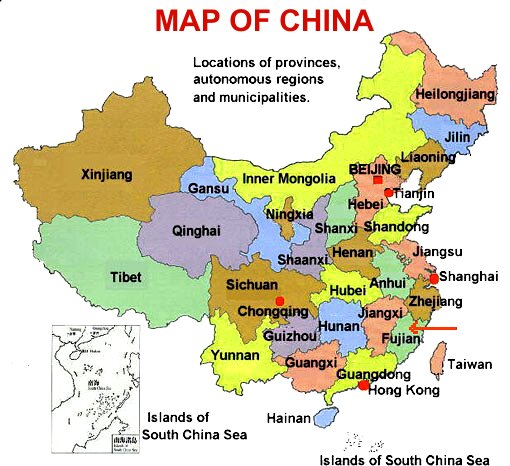 BEIJING, October 5, (Toronto) Globe and Mail [from The Economist] -- With commendable patience China awaits 2004. The talk in Beijing is that its next bid for the Olympic Games must surely be successful. Losing the 2000 Games to Sydney was indeed painful, but for a country that often reminds the rest of the world that Chinese civilization has been continuous for more than 3,000 years, the 10 years to the next Games can easily be endured. BEIJING, October 5, (Toronto) Globe and Mail [from The Economist] -- With commendable patience China awaits 2004. The talk in Beijing is that its next bid for the Olympic Games must surely be successful. Losing the 2000 Games to Sydney was indeed painful, but for a country that often reminds the rest of the world that Chinese civilization has been continuous for more than 3,000 years, the 10 years to the next Games can easily be endured.
During this interlude, the world will be giving Chinese civilization even more than usual attention. Chinese leader Deng Xiaoping will puff his last cigarette, making way for a new pensioner, or pensioners, to take over supreme power. Hong Kong and Macao (though probably not Taiwan) will be blended into the mainland. But one thing will not change; the Western democracies will continue to nag China about human rights, the issue that probably cost the country the 2000 Olympics.
China will continue to complain of foreign interference in its affairs, but will occasionally free a famous dissident, as it freed Wei Jingsheng while the International Olympic Committee was still making up its mind about awarding the 2000 Games. It seems improbable, though, that great humanitarian reforms are likely under the present regime.
Jailing dissidents not only removes them from society; it acts as a deterrent to others who may wish to criticize the Chinese Communist Party. Free them and allow them their say, and the party itself may feel endangered, as it did during the pro-democracy demonstrations in Beijing's Tiananmen Square in 1989.
Also, and importantly, prisoners make a profit for the state. They are the basis of China's secret economy, although increasingly it is an open secret. Jean Pasqualini, who spent seven years in a Chinese jail during Mao Tsetung's time, writes in the current China Quarterly, published by London University's School of Oriental and African Studies, that the jails play "an important role in the national economy."
He compares the Chinese system with those of Nazi Germany and the former Soviet Union, both of which used prisoners to benefit their economies, and says that neither "made use of slave labour so efficiently" as China does.
The number of people locked up in China is not known outside the government. Some human rights groups that try to come up with a believable number, as they once did for the Soviet Union and for Germany in 1933-45, work on a figure of about 20 million. Of these, perhaps 20,000 are "political" prisoners, although some analysts put the number much higher. China said in 1992 that it held some "counter-revolutionaries" but admitted to only 3,651.
But many of the millions of "criminals" are deserving of pity too. Chinese criminal justice is of medieval severity. Mass public executions are commonplace. Last week was a busy time for executioners, as they cleared a backlog of those condemned to death in the runup to Oct. 1, the National Day holiday. At least 100 were executed, among them eight young accountants accused of graft.
At a petty level, many offenders are jailed for offences for which in a Western country they would be let off with caution. If 20 million is correct, China's prison population works out at 1,740 per 100,000 of population. In the United States the comparable figure is 486 and in Britain 95.
All of China's prisoners, the politicos and the criminals, live in a vast network of prisons, camps and mental institutions known as the lao gai (short for laodong gaizao, meaning "reform through labour"), the equivalent of Stalin's gulag or Auschwitz, which bore the legend at its entrance Arbeit nacht frei (Work makes you free).
A labour force of 20 million is bigger than Spain's (15 million) and not much smaller than France's (24 million). It draws no pay, is fed on the cheapest food, is rudimentarily clothed, has no holidays and little health care. Those who die are soon replaced. Factories attached to the lao gai produce cars, trucks and a variety of smaller goods, among them textiles and toys. There are lao gai miners, often mining dangerous minerals, such as asbestos. Many of China's tea planatations are manned by prison labour.
China admits that its prisoners are put to work and says this helps them to "reform." Under Chinese law no prison products are supposed to be exported, but Harry Wu, a former prisoner who runs the Lao Gai Research Foundation in Califormia, says shops and supermarkets throughout the world sell goods made in the lao gai.
The United States and Britain formally prohibit the import of goods made in foreign prisons. In 1992, China and the United States signed a memorandum prohibiting trade in prison products, but since then the United States has said that it is "far from satisfied" that China is sticking to the agreement.
Checking whether something has been made under decent conditions or in a hellhole is pretty well impossible. The products do not bear a label saying, 'made in jail.' But anyone buying, say, a well-made and ridiculously cheap toy that came from China must wonder about its origin.
What Asia Watch, an American-based human rights group, calls "the last gulag" may be an economic asset to China. But for a country seeking the respect of Olympic people, and dozens of other international groups of influence, it will be an increasing burden.
|